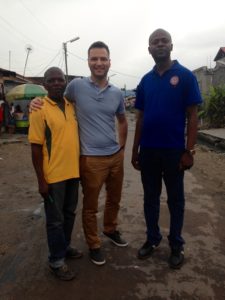“Seeing the way the kids are gradually rehabilitated, and being part of that process” is how Pére Stanislas Kimpeye, SJ describes the most rewarding aspect of his ministry. Pére Stanislas is the director of the Centre Mgr Munzihirwa, a project helping former street kids in the Funa district of Kinshasa.

The centre has three aspects to its work.
First it runs a hostel for 15 boys aged between 10-19 who were previously homeless and trying to survive on the harsh Kinshasa streets. Second, it offers training courses in joinery, metalwork, sewing and agriculture for destitute teenage boys and girls at three other sites around the city. Third, and most crucially, it provides pastoral, psychological and spiritual support for the children under its care.
“Our goal is to accompany the child in the development of all aspects of his or her life” Stanislas says, enunciating the key principle of care for the whole person which underpins the distinctively Jesuit approach to formation.
The centre is named after Mgr Munzihirwa, an outstanding advocate for social justice and Jesuit Archbishop of Bukavu, who was murdered in 1996 during the country’s civil war, largely due to his efforts to protect Rwandan and Burundian refugees.
Arriving on Saturday morning at the Centre’s hostel, I found the boys in high spirits as they prepared for a football match. The hostel is situated around the corner from Matongé, an area enjoying legendary status for its nightlife and infectiously joyful congolese Rumba rock.

Pére Stanislas explained that a boy typically stays in the hostel for up to eight months, although afterwards he continues with one of the courses at the Centre’s technical college. There are many reasons why the boys leave home and find themselves living on the streets, but special efforts are always made by the Centre to reunite boys with their families. Pére Stanislas tells me that he often acts as a mediator to facilitate family reconciliation. Poverty is a common driver behind a child ending up on the streets. The hope is that with the new skills learned in the Centre, the teenagers have a better chance of earning a living, and sometimes possess extra income to support their parents and siblings.

The Centre’s work is funded solely by voluntary donations and is especially dependent on the generosity of one German charity. This means the financial life of the Centre, which has a desire to expand its activities, is to some extent as precarious as that of the youngsters it helps.
After chatting with the boys and staff, we all (about 20 of us!) crammed into the Jesuit community’s truck, and headed to the football ground. After victory on the pitch, the boys were more jubilant than ever. Their particularly lively presence in the back of the truck on the way home attracted the attention of passers-by in this already energetic city, a place where immense life and talent sits alongside challenges of extreme poverty and vast inequalities.

